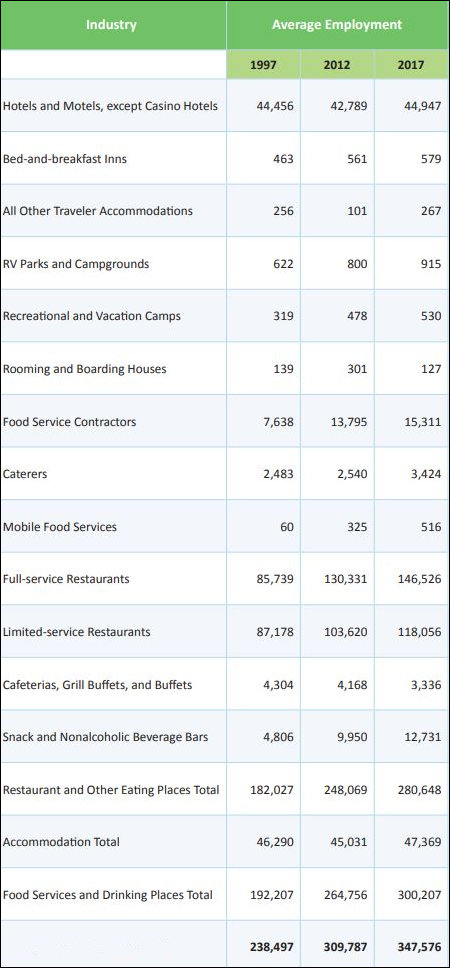As we explore the economic impact of the COVID-19 virus (and a hike in the minimum wage), it’s worth taking a look at the number of Virginia workers potentially affected. These numbers come from a 2018 Virginia Employment Commission report on Virginia’s Accommodation & Food Services sector, the state’s fourth largest industry. Average weekly wages of $367 in 2017 were the lowest of all industries in the state. — JAB
Employment Snapshot: Virginia Accommodations & Food Services
Share this article
ADVERTISEMENT
(comments below)
ADVERTISEMENT
(comments below)
Comments
7 responses to “Employment Snapshot: Virginia Accommodations & Food Services”
-
In my location I have submitted the following to the local government and large employer:
Since our localities declared a state of emergency, I came up with this idea:
With many restaurants, bars, and businesses having to lay employees off because of declining business or because of the Richmond gathering mandate – is there any way for those workers to be paid by [fill in the blank – county, state, local big business, etc.] to help clean/sanitize/disinfect those entities’ areas which will remain open?
Maybe the laid off workers could be hired by cleaning companies or other businesses? If we can connect the parties…
I am sure the HIGH demand to disinfect business’ surfaces [offices, desks, hallways, doors, etc.] will overwhelm the current companies’ housekeeping staff.
The new people could ‘shadow’ the housecleaning staff for a day to see HOW IT IS DONE; the second day the housecleaning staff would supervise the new people doing the disinfecting; on the third day the disinfecting staff has been doubled/tripled/etc.
This would be a win-win-win: workers work, citizens have a paycheck, business get a cadre of cleaners quickly.
-
Hmmmm…. I wonder what the employment numbers look like for house-cleaning and janitorial services.
-
-
There will be more food/grocery/prescription drug/other jobs.
Some small business, independent restaurants may be able to rent much smaller spaces just enough for kitchens.
There’s going to be more jobs for computer/phone applications for everything from better at-home, meetings, school software, etc…
There’s going to be more jobs for tele-medicine…
many more….
but as they have been saying all along – some jobs, you gotta get re-trained.
We are going to rethink how we do a lot of things and after this is over with, some will go back to what we did before and some will continue on the new path and others might disappear.
-
Fully agree people need to be open to changing careers and taking the training that they need. I’ve reinvented myself many times in my career. Someone needs advice in a related field to my specialties. I take some time to study the issue; work my way through it; and eat my learning costs. I’m far from alone.
-
-
In some respects, what’s happened is that people put off getting re-trained or just focusing on training for the jobs that do exist in the economy and this mess has brought it to the fore……. and some folks are going to get set adrift if they don’t now – get on to re-training.
This is a tremendous opportunity to change the way that K-12 schools “work”. This can be a better path forward or we can let it defeat us. We’re headed in this direction anyhow – it just becomes a matter of how many will refuse to migrate and how many will migrate and how many will embrace it and thrive.
Kids who are saddled with not-so-great neighborhood schools in low-income neighborhoods – now have a chance to change their destiny.
-
These are good ideas at the micro level. However, they are likely to run into friction at the macro level. It seems to me that the biggest challenge will be the velocity of money. As jobless claims rise, 401 (k)’s dwindle and consumer confidence flags people stop spending. Once the economy hits the brakes there will be fewer opportunities almost regardless of what area a person chooses for employment. Grocery stores are a perfect example. There has been no fundamental rise in demand for food. Only a temporary rise due to hoarding. Once the home pantries are full people will actually go to the grocery stores less than usual. This could have a truly bizarre impact as grocery stores start to feel economic pressure as people live off hoarded food for a while (and avoid going out at all). The economics of a “sudden stop” are reasonably well understood in the developing world but not nearly so well understood in developed countries like the US.
-
Au Contraire!
Have you seen what is going on with Grocery pickup and delivery?
Also, if the grocery business is moving ahead as usual in terms of sales, WHERE is the money to buy groceries coming from?
The economy is severely damaged but a long way from dead. It will go on and it will find new/different ways to go on and some of those new ways will shape the future, cause reexamination of regulation, of universal health care, of education from home, you name it – fundamental change is happening right now, some of it just accelerating already changing trends but others will disrupt and obsolete other things.
Finally, you can BET that after this is over with – “lessons learned” will become an entire industry for the govt and buzz words like “resilience” will fly like mosquitoes in a swamp!
-


Leave a Reply
You must be logged in to post a comment.